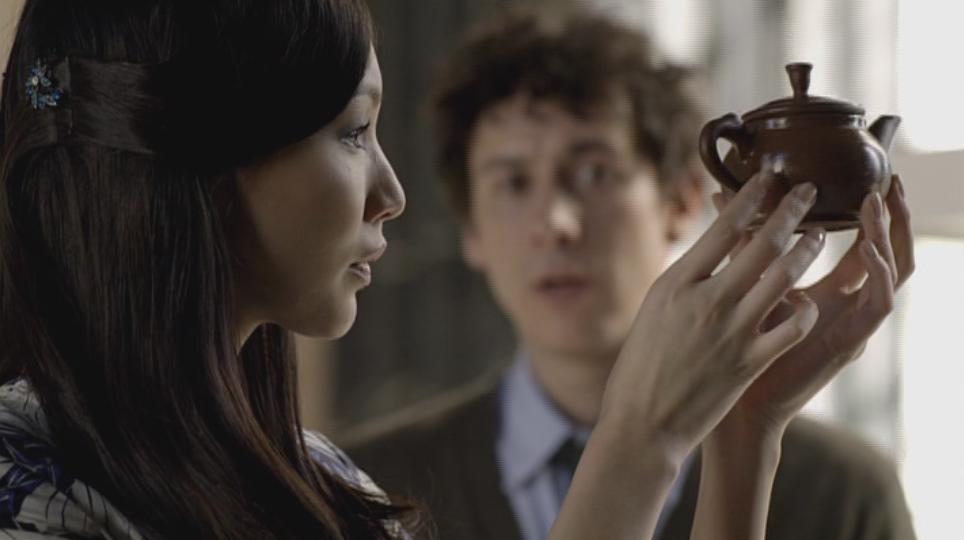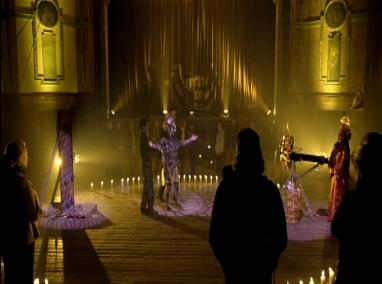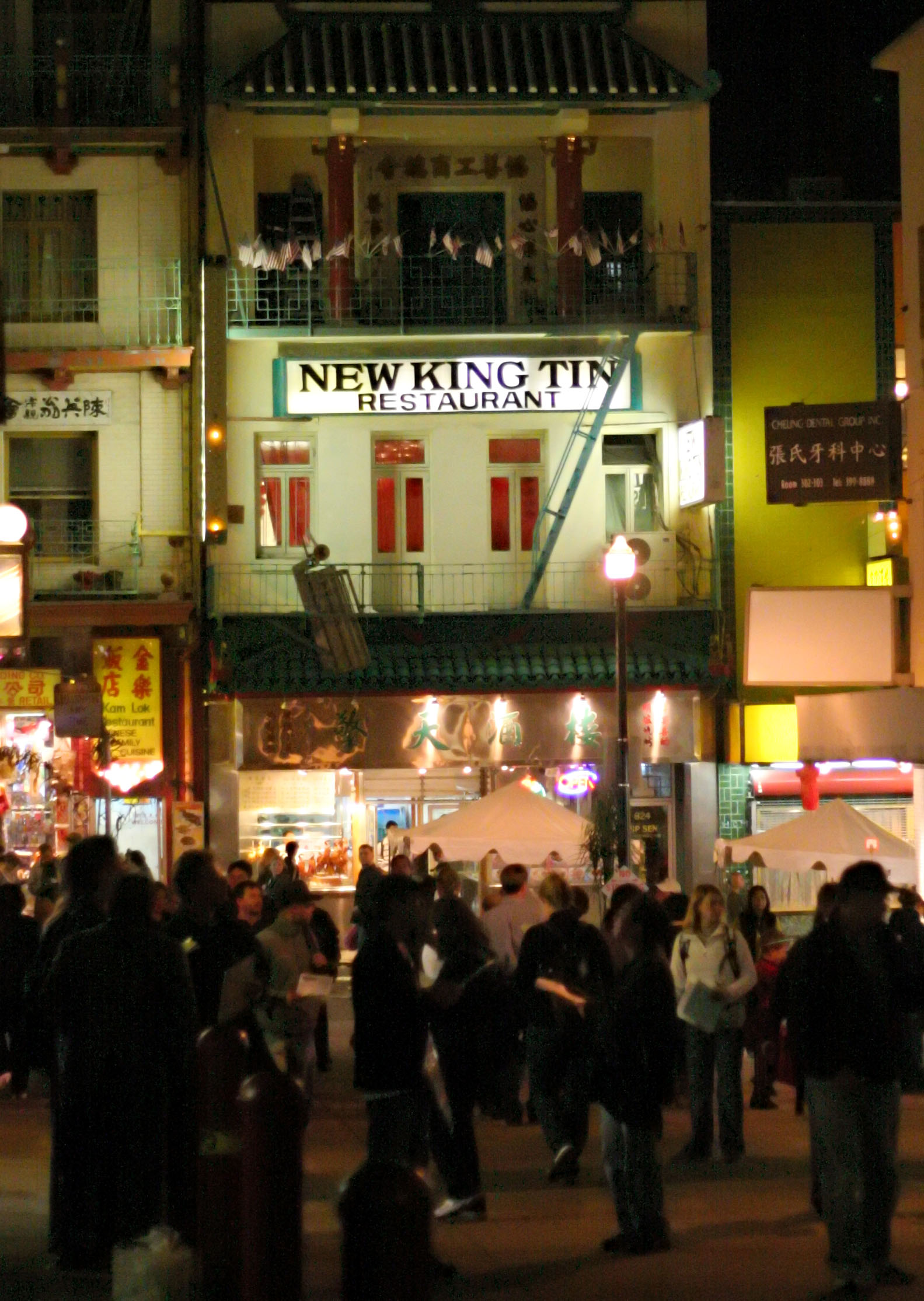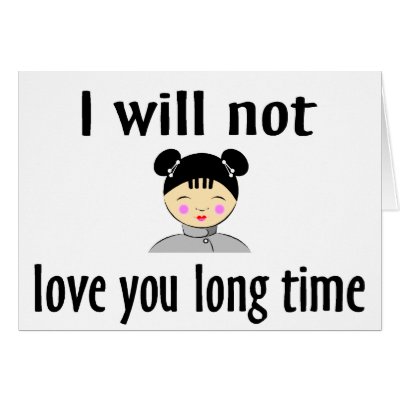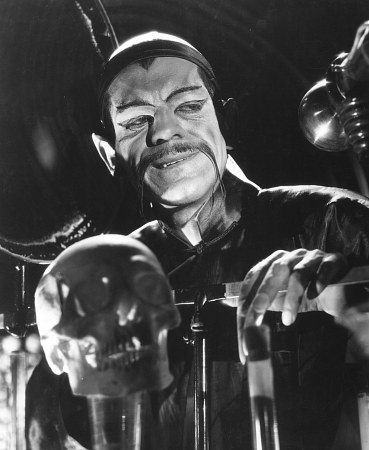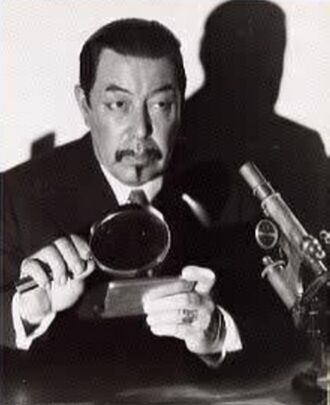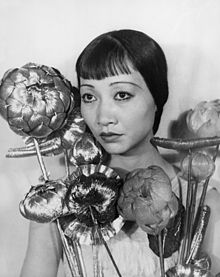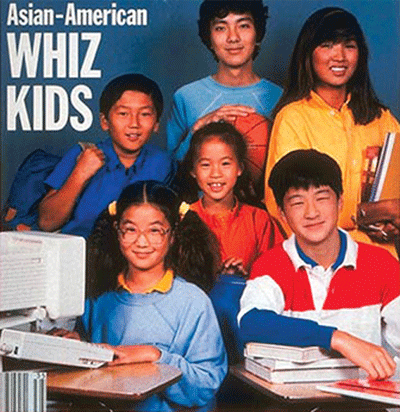Sherlock, a modern day adaptation of the awesome books by Sir Arthur Conan Doyle, is a fast-paced, funny series (with three episodes), produced and written by Mark Gatiss and Steven Moffat (writers for Doctor Who). It's a BBC program that debuted on PBS' Masterpiece Mystery in October and many wonderful blurbs have been written about it. I really really enjoy this show (understatement - I'm ever so slightly addicted to it) except for this episode, entitled The Blind Banker.
Adapted from the original stories of The Valley of Fear and The Adventure of the Dancing Men, this story involves a Chinese smuggling gang, a China Doll/Lotus Blossom, a Dragon Lady, an ancient form of Chinese writing, Chinese acrobatics and a tea ceremony. Oh yeah, and two white people get murdered.
Is it any wonder that I was more than slightly offended while watching this?
My Complaints:
1. Soo Lin Yao (played by Gemma Chan) - The China Doll. She's pretty and innocent-looking, all wide-eyed and silky black hair and a non-whore-y, British Suzie Wong. She works at some museum in London where she performs a tea ceremony for tourists, spewing silly aphorisms about tea and shiny teapots. She escaped from China after being orphaned and joining a gang (called The Black Lotus - cringe) and smuggling drugs. Off she goes to London to a new life where she can do cute little tea ceremonies and have dorky little English boys try to ask her out. But alas! She is not safe! The Black Lotus catches up to her and BANG! She's shot dead by her own brother. Soo Lin Yao is pathetic and lacking in a backbone.
2. The Black Lotus Gang - Also referred to as a tong*. The gang, posing as a Chinese circus troupe, threatens their victims by spray painting yellow characters as part of a mysterious cipher onto a surface close to their victims. Then they track down their targets, kill them, and then plant a black origami (which is Japanese, people...) lotus somewhere on their body. The yellow paint is a clear indicator of the sickening racism embedded in the fetishized "Oriental" aspects of the story. Yellow? Can you get any more obvious? The origami lotuses are another indicator of ignorance and dismissiveness. Origami is Japanese. While there were forms of paper folding arts in other places in the world (even China), the art of origami remains a specifically Japanese art form. It is this sort of mixing of the two cultures without research that is increasingly annoying and offensive. The fetishization of the lotus flower doesn't help either.
3. "The One They Call 'Shan!'" (not even listed in the Casting Credits - the indignity!) - The Dragon Lady. She controls The Black Lotus. She tortures John Watson. She wields a gun. She speaks with an awful, exaggerated accent, with her l's and her r's getting mixed up all over the place. She is ruthless. She dons a traditional-looking Chinese opera outfit and facilitates "death-defying acts from the Yangtze River!" She doesn't seduce anybody (Thank goodness) but she does watch Sherlock and John Watson do their mystery-solving from behind shady (pun intended) black glasses with an evil warlord-esque smirk on her face. She's the female Fu Manchu, with Sherlock playing the role of the great good white knight out to save the day and prevent "The One They Call 'Shan!'"
4. The Villain of Indeterminate Race But is Obviously Not White - This character makes a brief appearance in the very beginning of the show as a samurai-sword-brandishing, turbaned, long-robed assassin enters 221B and attacks Sherlock! But, with Sherlock being the great white knight, this Assassin of Indeterminate Race is no match for our white-as-white-can-be hero (no slights on Benedict Cumberbatch intended), who easily defeats him with no weapons at all. For starters, the samurai sword being wielded by the man dressed in Berber-esque clothing? Mishmash of cultures, even a culture that deserves its very own independent study. Uncool, making that mishmash of cultures into the villain. And even worse, the bits of Sherlock versus Villain of Color and interspersed with John trying and failing to do the self-checkout line at the grocery store, so that the entire opening sequence really comes off as slapstick. All in all, it's a slapstick Unnamed Villain of Color versus White Knight Sherlock. Come on, we can do better than that, BBC!
5. The Dangerous Mystique of London's Chinatown - I don't think there was a single shot that was located in this setting that didn't scream, "This is a creepy, shadowy, mysterious place full of shady people who may or may not be assassins, and who knows? Maybe you'll find an opium den if you look hard enough!" Not only that, but Sherlock and John decide to go into the "Lucky Cat Emporium" to look for clues, where an old lady tells them, "You buy Rucky Cat? Onry ten pound! Your wife, she will rike!" In the "Lucky Cat Emporium," an old Chinese lady tries to sell a "Rucky Cat" to John, which he politely refuses. I am not joking. Do I even need to explain the incredibly blatant racism in that one little bit of a scene?
6. The Code! - There's a cipher code thing used to communicate with other members of the Black Lotus, and the code starts with a series of numbers that refer to page numbers in a certain book and then the first word on that page. The numbers are written in Suzhou (mistakenly called "Hangzhou" by Sherlock - tsk, tsk, writer of the script, do some research!), which then refer to the book "London A to Z." Again, more mysteriousness for shading dealings of drugs and other goods... Sneaky sneaky.
7. The Music - The Sherlock theme and the usual background suspenseful music is stellar. But whenever Soo Lin Yao or The One They Call Shan showed up on screen, there was a sudden bout of Zen-like flute and some atmospheric zithers to accompany it (Thankfully, no obscenely loud gongs a la Long Duk Dong). I'm getting sick of zithers. And when Unnamed Indeterminate Race Villain of Color made his dastardly appearance there was - you guessed it - some funky funky sitar sounds. It was painful.
It's really frightening that this slipped under the noses, maybe even was applauded, by the producers of the show. But is it because it was made in Britain? Is being Asian different over there? Would all the things I found offensive be considered offensive in the UK, or all over the world? Should I just start lowering my expectations for media that features either a token Asian or some sort of Asian-themed thing? Who knows?
Predictable and degrading stereotypes aside, the most frustrating this is that the original plot of The Dancing Men does not involve a Chinese gang at all, nor does The Valley of Fear. The Dancing Men has an American criminal chasing down an old flame and the Valley of Fear has no foreign criminal involvement at all. So why incorporate a Chinese crime ring involved in smuggling drugs and other goods around the world? That decision seemed to come completely out of left field with no real reason for it other than the fact that it would provide cheap entertainment and mystique to a story that would have been just as exciting as if it didn't have that "Oriental" vibe going on.
I can only hope that next season doesn't feature stuff like this again.
*The word "tong" has come to have unfortunate connotations because of its association with the term "tong war," referring to armed conflicts between rival Chinese groups seeking to control illegal activities such as gambling, opium smoking, and prostitution. "Tong" actually means "hall" or "parlor," in the sense of a society or association, and most Chinese tongs were men's fraternal or social organizations that existed to provide benevolent services to their members. (From http://www.uiweb.uidaho.edu/LS/AACC/SENSITIV.HTM)
A super great review of the Blind Banker, please read for more insight on the topics above!
Musings, rants, and other good stuff on the evolution of the depictions of Asians/Asian-Americans in television, films, and pop culture. Lick-Wilmerding Independent Study '11
Keep on Wondering...
What are the connections between social and historical forces and the representations we see?
Why is yellowface still acceptable? When and how did yellowface turn into whitewashing?
How do these representations create and/or perpetuate stereotypes that are present in our world? What is the impact?
Tuesday, January 11, 2011
Monday, January 3, 2011
Fresh Starts
It's the start of a new semester and the start of some new theme exploration! Yippee!
What to Look Forward To:
1. More movies! More books! More television shows!
2. Possibly an entire section on children's TV shows and all their craziness.
3. Another collage!
But there will be less of this:
And more of this:
So there will be more of a focus on whitewashing and the positions that Asian American actors are in nowadays in the film industry than focusing on yellowface and its historical context and implications.
Huzzah!
What to Look Forward To:
1. More movies! More books! More television shows!
2. Possibly an entire section on children's TV shows and all their craziness.
3. Another collage!
But there will be less of this:
And more of this:
So there will be more of a focus on whitewashing and the positions that Asian American actors are in nowadays in the film industry than focusing on yellowface and its historical context and implications.
Huzzah!
Monday, December 27, 2010
Wednesday, December 15, 2010
Looking Backwards
Warning: Somewhat incoherent and wiggly wonderings ahead. Enjoy!
As the year/semester draws to a close, I have begun thinking about all of the things I've learned, gotten mad at, felt offended or inspired by, or that have just left me speechless.
It's daunting, actually, to scroll back through all my other posts and summarize what I've learned. It's like completing grade school and then having to go back and remember what you did on the 100th day of school in kindergarten. Daunting.
As the year/semester draws to a close, I have begun thinking about all of the things I've learned, gotten mad at, felt offended or inspired by, or that have just left me speechless.
It's daunting, actually, to scroll back through all my other posts and summarize what I've learned. It's like completing grade school and then having to go back and remember what you did on the 100th day of school in kindergarten. Daunting.
Before I went into this study/blog/craziness, I had relatively little understanding of how Asians have been represented in the media, how they have been treated in America, and how it continues to exist today. I had virtually no idea about what it means to be Asian American.
I'm not saying that because of this blog I've had this great epiphany and I know and understand every single Asian American's experience. Instead, I have a deeper understanding of the stereotypes that still exist today and a better understanding of why I may have perceived something as racist (with historical context to boot).
I'm not saying that because of this blog I've had this great epiphany and I know and understand every single Asian American's experience. Instead, I have a deeper understanding of the stereotypes that still exist today and a better understanding of why I may have perceived something as racist (with historical context to boot).
What are the connections between social and historical forces and the representations we see?
Why is yellowface still acceptable? When and how did yellowface turn into whitewashing?
How do these representations create and/or perpetuate stereotypes that are present in our world? What is the impact?
These questions have been hanging over my head all semester, and I keep wondering if I'm answering them fully. Or if I'm keeping them in mind as I type and try to analyze the movies and television shows I see. Or if my readers even stopped to read these questions. Sometimes I'm even wondering if these stereotypes matter. I know that's a blunt way of putting it, but what if nobody else sees the things I do? Is it my job to get up on my soap box blog and tell the world about these stereotypes and how damaging they are? Do people care? I care. That's kinda why I did an Independent Study in it...
I'm also wondering if yellowface is acceptable to other people, or if it's even part of society's consciousness. I've read so many comments on the IMDB listings for the movies I've watched that have yellowface, and they all say things like, "Ignore the fact that there's Caucasian actors playing Chinese people, this movie is awesome!" Or "I don't think this movie is racist. It's so funny when the white guy imitates the Oriental!" Or "LOL i luv jake gyllenhaaaaaaaaaal!!!!!!11111!!!!1!!!!!1111111111!!!!!1" These comments make me not only concerned about the state of humanity, but also whether or not yellowface is accepted and... liked? Or is it even given a second thought except for me and a few other people?
Look at my first post ever. I've come a long way. Seriously, I have.
Be prepared for 2011. Even more analysis and soap box soliloquies to come.
More reflections to be posted in the comments section below!
I'm also wondering if yellowface is acceptable to other people, or if it's even part of society's consciousness. I've read so many comments on the IMDB listings for the movies I've watched that have yellowface, and they all say things like, "Ignore the fact that there's Caucasian actors playing Chinese people, this movie is awesome!" Or "I don't think this movie is racist. It's so funny when the white guy imitates the Oriental!" Or "LOL i luv jake gyllenhaaaaaaaaaal!!!!!!11111!!!!1!!!!!1111111111!!!!!1" These comments make me not only concerned about the state of humanity, but also whether or not yellowface is accepted and... liked? Or is it even given a second thought except for me and a few other people?
Look at my first post ever. I've come a long way. Seriously, I have.
Be prepared for 2011. Even more analysis and soap box soliloquies to come.
More reflections to be posted in the comments section below!
Wednesday, December 8, 2010
Margaret Cho and the Dilemma of Comedy
Let me start by stating that Margaret Cho is a badass. She really, truly is. She's sassy and brilliant. She has no qualms about giving the finger to society. She's a champion for Asian American and LGBTQ rights. She's fantastic! She was on Dancing With the Stars!
Comedy is an iffy arena for Asian Americans. Comedy is iffy for anybody, because you can't "make it" as a comedian unless people find you funny. But. People find Margaret Cho funny! And I can't say I blame them.
The first 2 minutes and 8 seconds make such a nice summary of the sentiments of this blog - Asian Americans have always strived for acceptance, tried to assimilate, but based on the cultural stereotypes we have seen perpetuated in the media over the years, it's been made pretty difficult.
These "people who don't understand the concept of being Asian American" are the ones who keep on believing in the "Perpetual Foreigner" stereotype. Cho's standup highlights that marvelously. Those questions/statements are annoying and something that Asians/-Americans must face almost every day, but the fact that they can be turned into comic material and can be accepted by the audience is something in itself.
Then, of course, there's Cho's "Mommy" material that she employs heavily in her standup. It's mostly her squinching up her face and speaking in an exaggerated "Asian/Korean Mommy" accent. In any other non-Asian comedian's hands, that could come off as racist or demeaning. On it's own, it's slightly racist and demeaning. Is it acceptable because it's Margaret Cho, because she's Asian-American? Is it okay to do because that's what her audience wants? Should she just cut that part of her act completely, because it is potentially offensive? Has anyone been offended by it? I often find myself halfheartedly laughing along with her "Mommy" impersonations, wondering whether it's okay for me to laugh or not.
Is it possible that Margaret Cho would still be as popular if she completely cut the "Mommy" bits from her stand-up routines? I think she would, she's still very funny and witty and sassy enough to be hilarious. But would other people still enjoy her? Obviously, you can't be holding out for universal popularity as a comedian, but.... Would she still be as immensely popular as she is now if she had no "Asian accent" going on? Do people expect that an Asian comedian will employ the "Asian accent" and it'll be so funny and awesome and ohmygod they are my new favorite comedian!
Comedy is about making people laugh, making your jokes accessible to everyone. But when an Asian-American employs an accent of their people in their routine... is that catering to non-Asian people's taste? Do other Asian-Americans find it funny? We afraid to speak up and say, "The accent is not funny. The accent is the perpetuation of the Foreigner stereotype." Let's dump our Model Minority umbrella, proclaim "The accent is dead!" and have a successful stand up routine with no accents! With no caricaturization of the Asian accent or Asian people! REAL representation is needed!
More coming soon!
Comedy is an iffy arena for Asian Americans. Comedy is iffy for anybody, because you can't "make it" as a comedian unless people find you funny. But. People find Margaret Cho funny! And I can't say I blame them.
The first 2 minutes and 8 seconds make such a nice summary of the sentiments of this blog - Asian Americans have always strived for acceptance, tried to assimilate, but based on the cultural stereotypes we have seen perpetuated in the media over the years, it's been made pretty difficult.
These "people who don't understand the concept of being Asian American" are the ones who keep on believing in the "Perpetual Foreigner" stereotype. Cho's standup highlights that marvelously. Those questions/statements are annoying and something that Asians/-Americans must face almost every day, but the fact that they can be turned into comic material and can be accepted by the audience is something in itself.
Then, of course, there's Cho's "Mommy" material that she employs heavily in her standup. It's mostly her squinching up her face and speaking in an exaggerated "Asian/Korean Mommy" accent. In any other non-Asian comedian's hands, that could come off as racist or demeaning. On it's own, it's slightly racist and demeaning. Is it acceptable because it's Margaret Cho, because she's Asian-American? Is it okay to do because that's what her audience wants? Should she just cut that part of her act completely, because it is potentially offensive? Has anyone been offended by it? I often find myself halfheartedly laughing along with her "Mommy" impersonations, wondering whether it's okay for me to laugh or not.
Is it possible that Margaret Cho would still be as popular if she completely cut the "Mommy" bits from her stand-up routines? I think she would, she's still very funny and witty and sassy enough to be hilarious. But would other people still enjoy her? Obviously, you can't be holding out for universal popularity as a comedian, but.... Would she still be as immensely popular as she is now if she had no "Asian accent" going on? Do people expect that an Asian comedian will employ the "Asian accent" and it'll be so funny and awesome and ohmygod they are my new favorite comedian!
Comedy is about making people laugh, making your jokes accessible to everyone. But when an Asian-American employs an accent of their people in their routine... is that catering to non-Asian people's taste? Do other Asian-Americans find it funny? We afraid to speak up and say, "The accent is not funny. The accent is the perpetuation of the Foreigner stereotype." Let's dump our Model Minority umbrella, proclaim "The accent is dead!" and have a successful stand up routine with no accents! With no caricaturization of the Asian accent or Asian people! REAL representation is needed!
More coming soon!
Thursday, December 2, 2010
Terminology. That's What.
Yellowface - the practice of putting a non-Asian actor (usually white) into makeup and prosthetics that alter the actor's appearance and make them "look" Asian. The actor will also usually employ some garbled interpretation of an "Asian" accent.
Fu Manchu - a catch-all name for the male Asian antagonists in movies that are evil and evilly Asian and Asianly evil. Sometimes will speak with an accent, sometimes without. Often portrayed as sly, manipulative, cunning, and in some cases, with an insatiable appetite for sex, usually lusting after white woman.
Charlie Chan - another catch-all phrase for the polar opposite of the Fu Manchu. A character that is a Charlie Chan or a son of Chan is subservient, "adorable," a kiss-ass to white characters, asexual (towards anyone in any race), often portrayed with a heavy accent.
Lotus Blossom/China Doll - a subservient, demure girl with no backbone and no feelings. Often shown as an innocent, beautiful sexual toy who is corrupted by and infatuated with white men. The accent or lack thereof changes with every role.
Dragon Lady - the female Fu Manchu. Often has a penchant for killing people or busting out some karate chop hands. She is fierce, cunning, manipulative, powerful and a dangerously sexy gold digger.
 The Badass Mute - also known as the Bruce Lee, or, depending on the age of the character, a Mr. Miyagi. A buff and wise kung fu master who only speaks in proverbs and remains serene until it's time to kick some ass and then meditate. Sometimes a sexualized character, sometimes not. Enforces the idea that Asian people all have the innate ability to perform martial arts.
The Badass Mute - also known as the Bruce Lee, or, depending on the age of the character, a Mr. Miyagi. A buff and wise kung fu master who only speaks in proverbs and remains serene until it's time to kick some ass and then meditate. Sometimes a sexualized character, sometimes not. Enforces the idea that Asian people all have the innate ability to perform martial arts.
Model Minority - referring to a minority group who is considered "successful" in a society where the majority is not. When applied to Asians, it implies that they will keep their head down, earn perfect scores on their SATs, not make a fuss when made fun of. Asians are considered hardworking and incredibly smart in math and science, or piano prodigies. The model minority stereotype foists higher expectations on people of Asian descent to do well and be naturally good at everything, except perhaps having a backbone or be socially present in white-dominated society.
The Perpetual Foreigner - the assumption that Asians will never fully integrate into American society because of their race, and that they will always have an accent, always be loyal to their "mother country," and never be truly American. This is more of a subconscious stereotype that serves as a backdrop to the top 5 definitions listed here.
I'll add more later, promise.
Fu Manchu - a catch-all name for the male Asian antagonists in movies that are evil and evilly Asian and Asianly evil. Sometimes will speak with an accent, sometimes without. Often portrayed as sly, manipulative, cunning, and in some cases, with an insatiable appetite for sex, usually lusting after white woman.
Charlie Chan - another catch-all phrase for the polar opposite of the Fu Manchu. A character that is a Charlie Chan or a son of Chan is subservient, "adorable," a kiss-ass to white characters, asexual (towards anyone in any race), often portrayed with a heavy accent.
Lotus Blossom/China Doll - a subservient, demure girl with no backbone and no feelings. Often shown as an innocent, beautiful sexual toy who is corrupted by and infatuated with white men. The accent or lack thereof changes with every role.
Dragon Lady - the female Fu Manchu. Often has a penchant for killing people or busting out some karate chop hands. She is fierce, cunning, manipulative, powerful and a dangerously sexy gold digger.
 The Badass Mute - also known as the Bruce Lee, or, depending on the age of the character, a Mr. Miyagi. A buff and wise kung fu master who only speaks in proverbs and remains serene until it's time to kick some ass and then meditate. Sometimes a sexualized character, sometimes not. Enforces the idea that Asian people all have the innate ability to perform martial arts.
The Badass Mute - also known as the Bruce Lee, or, depending on the age of the character, a Mr. Miyagi. A buff and wise kung fu master who only speaks in proverbs and remains serene until it's time to kick some ass and then meditate. Sometimes a sexualized character, sometimes not. Enforces the idea that Asian people all have the innate ability to perform martial arts. Model Minority - referring to a minority group who is considered "successful" in a society where the majority is not. When applied to Asians, it implies that they will keep their head down, earn perfect scores on their SATs, not make a fuss when made fun of. Asians are considered hardworking and incredibly smart in math and science, or piano prodigies. The model minority stereotype foists higher expectations on people of Asian descent to do well and be naturally good at everything, except perhaps having a backbone or be socially present in white-dominated society.
The Perpetual Foreigner - the assumption that Asians will never fully integrate into American society because of their race, and that they will always have an accent, always be loyal to their "mother country," and never be truly American. This is more of a subconscious stereotype that serves as a backdrop to the top 5 definitions listed here.
I'll add more later, promise.
Monday, November 29, 2010
Joy Luck Club
There's no way I can claim to have a decent Asians/-Americans in the media blog without mentioning this movie. No way.
Based on Amy Tan's book of the same name, Joy Luck Club (1993) is the story of four Chinese immigrant mothers and their relationships with their grown Chinese-American daughters. Su Yuan, Lindo, Ying Ying, and An-Mei were all born and raised in feudal China, and get together once a week to play mah-jong and drink tea and hope to be lucky in their lives. Their daughters, June, Waverly, Lena, and Rose, were born and raised in America. Su Yuan (Kieu Chinh) has passed away before the movie begins, and her story is told by June, her daughter. We learn about all of the seven other women in their various flashbacks to adolescence and childhood. Su Yuan was married in China to a different man and had twin baby girls. The Japanese invade China and she is forced to evacuate her village and head for Chungking with nothing but her babies. Along the way, she contracts dysentery and is worried that if she dies, it will bring bad luck on her babies and they won't be rescued. So she leaves them at the side of the road with a note asking whoever finds them to contact their father. She then winds up in America, remarries, and has her daughter June (Ming-Na), but she is forever haunted by the loss of her babies. Su Yuan has June begin to play the piano, hoping that she is gifted and will be a child star. However, June doesn't really want to do that, and she doesn't get why her mom wants her to - in fact, she doesn't get her mom at all. Lindo (Tsai Chin) was given away by her mother at age sixteen as part of an arranged marriage to a boy who was sixteen as well. Her husband had no sexual interest in her at all, and they became like brother and sister. Unfortunately, the boy's mother wants Lindo to produce a grandson for her, so she restricts Lindo to her bed until she gives birth to a baby. Lindo makes a plan to get out of her marriage which relies on her mother-in-law's belief in superstition. She escapes to America, remarries, has a daughter, Waverly, and becomes Su Yuan's best friend. The two women raise their children together, and Waverly and June grow up as rivals. Lindo makes Waverly (Tamlyn Tomita) into a chess champion, but has very high expectations of Waverly. When Waverly thinks her mom is using her champion status to draw attention to herself, Waverly quits chess and never plays again, but remains constantly afraid of her mother's criticisms. Ying-ying (France Nuyen) grew up meek and quiet and ended up marrying an abusive douchebag who sleeps around and treats her like dirt. They have a son together, but Ying-ying, wanting revenge, drowns the son. Her husband dies, and she goes to America with her new husband. They have a daughter, Lena, who grows up like her mother, quiet and unable to express herself. Lena (Lauren Tom) winds up in a marriage where her husband makes their relationship financially "equal" and therefore saps their relationship of all tenderness and caring. Lena ends up divorcing her husband and meeting someone new. An-Mei's (Lisa Lu) mother was raped by a wealthy man, and, having nowhere else to turn, she becomes his Fourth Wife and leaves An-Mei to be raised by her grandparents. Eventually, An-Mei's mother comes back for her and brings her to the house of her new husband, where she gave birth to a boy (as result of the rape) who has been adopted by Second Wife, a cruel and manipulative woman. An-Mei's mother commits suicide by eating opium before New Year's. An-Mei realizes her worth, and what has been going on in her new home, and demands that her "stepfather" treat her and her half-brother like they were his children from a First Wife. When An-Mei moves to America, she marries and has a daughter, Rose. Rose (Rosalind Chao) ends up marrying a white man who married her just to spite his racist mother. She is entirely dependent on him and he makes all of the decisions in their relationship. However, he ends up losing interest in her and having an affair. Rose and he decide to split their property and custody of their daughter, until Rose finally learns to stand up for herself and ask for her proper share of the property. All of these flashbacks are occurring during a farewell party for June, who will be going to China to meet the lost twins, who are now grown women and want to meet their mother. However, they don't know that their mother has died, so June must be the bringer of bad news. She goes to China and tells them that their mother has died, but that she came to take her mother's place. And so it ends, with an abundance of Kleenex and tears.
There are some really lovely, normal bits in this film, like all the scenes at June's farewell party before she leaves for China. Watching those scenes is like watching any party video. Everyone is acting normal, being regular human beings. If you were to cut out all of the flashbacks and just watch the party scenes, you would see normality, where (in the words of John Cho) "race is a fraction of their identity rather than the sum of their identity." We saw this a little bit in 21 Jump Street and a little more in Harold & Kumar - cool people in America doing regular people things and they just happen to be Asian. They're not smoking opium in dark corners (and there are no references to opium at all in this movie! Joy!) or something. True, there's a mah-jong game being played, but... that's still pretty normal. The people at this party are chatting, eating, drinking (not excessively), being pleasant. There are moments of tenderness (when June is telling Rose's daughter a story), short moments of happiness and gaiety (when a bottle of champagne is opened and it goes everywhere and everyone laughs), moments of chuckle-to-yourself-sweetness (when June is invited to join her mother's best friends at their mah-jong table). It's incredibly human, and that is some REAL representation. Normality! It's great!
Empowering towards women (especially Asian women), this movie is. The plot, the characters, the relationships - all showing women in a positive light. The only women who are really portrayed as evil or corrupt are left back in China or ignored. The mother figures are shown as caring albeit misunderstood leaders who channel their inner strength in times of need. Almost all of the mothers had previous marriages and escaped them. Their daughters find their inner strength and overcome their own obstacles as well, with nothing but themselves and their mommy's anecdotes to get them through it all. Three of the daughters also end their primary marriages and pursue new ones. Almost none of the Asian stereotypes surrounding women are perpetuated here. There are no murderous, scheming, devilish Dragon Ladies. None of the women act in the manner of Suzie Wong. They don't parade around in body-hugging qipaos doing the cha-cha or seducing white men or selling themselves. The only stereotype that you see here is the one of the Lotus Blossom; however, that stereotype is overcome and pushed aside as the characters mature into stronger women. Joy Luck Club shows this transformation and rejection, not of the stereotype, of the role and oppression of their situation which causes them to act in accordance of that stereotype. The daughters might begin by subscribing to the model minority stereotype (the prodigy children, June and Waverly), but they end up quitting those roles and going on to be themselves. Strong women and the mother-daughter relationship is at the center of the entire film. So watch it with your mom and I dare you not to cry.
I understand, however, how this film could not do so well in representing men. There's the creep who got his Fourth Wife by raping her, who doesn't end up feeling bad until she dies and her daughter (An-Mei) tells him that her mommy's ghost will come back to settle scores. There's the abusive and manipulative husband who sleeps around and isn't afraid to show it in front of his wife (Ying-Ying). There's the money-grubbing, unloving control freak (Lena's husband). Two sexual predators, one eunuch. All are misogynistic. The eunuch we can immediately classify as a Charlie Chan spin-off - uninterested in love, roly-poly, comical-looking, annoying. The two sexual predators are descendants of our favorite Fu Manchu, or maybe General Yen. Preying on women all the time, being manipulative, sly, crafty, cunning, you name it - they are portrayed as overly sexualized, threatening men.
There's only one good portrayal of an Asian man in this film, and that is of June's father. June is about to leave to go meet her half-sisters in China. She finds her father sifting through a box of her mother's possessions to find things for the half-sisters to have, because "We have memories of Mommy in here [points to his head], and now they can have memories of Mommy." It's heartbreaking. And sweet. Because June's father loves her and loved her mommy. Reach for Kleenex, go ahead. But this character, who spends maybe all of seven minutes on the screen, is the only really positive male character we see in the film.
Granted, neither the movie or the book are about men. It's about women, and the relationship between mother and daughter. But the men still matter. And I am unsure whether a movie like this one, with all it's groundbreaking, it's heartfelt-sobfest-ness, can be considered "real representation" if only the women get the proper portrayals. True, women have historically been the more repressed sex, but we can't call it equal representation if it's segregated by gender towards the female side. And, historically, Asian men haven't been represented in that great of a light either. This film is great for the portrayals when you ignore all the men (except June's dad) and focus solely on the women being mommies and daughters.
Fun Facts About The Film (just because):
Russell Wong, who plays Ying-ying's abusive and cheating husband, also had a lead role in the episode of "The Dragon and the Angel" on 21 Jump Street. Amy Tan has a cameo in the very first scene. She enters the party with her movie family and gives a hug to another guest. My cousin was an extra. Ming-Na, who plays June, was also the voice (talking only, not the singing voice) of Mulan in both Mulan and Mulan II. In the scene of June's piano recital, the girl who is before her is singing "I Enjoy Being a Girl" from Flower Drum Song. Nancy Kwan is not in this movie. Neither is James Shigeta. I wonder why?
Dissenting Opinions
And more!
Based on Amy Tan's book of the same name, Joy Luck Club (1993) is the story of four Chinese immigrant mothers and their relationships with their grown Chinese-American daughters. Su Yuan, Lindo, Ying Ying, and An-Mei were all born and raised in feudal China, and get together once a week to play mah-jong and drink tea and hope to be lucky in their lives. Their daughters, June, Waverly, Lena, and Rose, were born and raised in America. Su Yuan (Kieu Chinh) has passed away before the movie begins, and her story is told by June, her daughter. We learn about all of the seven other women in their various flashbacks to adolescence and childhood. Su Yuan was married in China to a different man and had twin baby girls. The Japanese invade China and she is forced to evacuate her village and head for Chungking with nothing but her babies. Along the way, she contracts dysentery and is worried that if she dies, it will bring bad luck on her babies and they won't be rescued. So she leaves them at the side of the road with a note asking whoever finds them to contact their father. She then winds up in America, remarries, and has her daughter June (Ming-Na), but she is forever haunted by the loss of her babies. Su Yuan has June begin to play the piano, hoping that she is gifted and will be a child star. However, June doesn't really want to do that, and she doesn't get why her mom wants her to - in fact, she doesn't get her mom at all. Lindo (Tsai Chin) was given away by her mother at age sixteen as part of an arranged marriage to a boy who was sixteen as well. Her husband had no sexual interest in her at all, and they became like brother and sister. Unfortunately, the boy's mother wants Lindo to produce a grandson for her, so she restricts Lindo to her bed until she gives birth to a baby. Lindo makes a plan to get out of her marriage which relies on her mother-in-law's belief in superstition. She escapes to America, remarries, has a daughter, Waverly, and becomes Su Yuan's best friend. The two women raise their children together, and Waverly and June grow up as rivals. Lindo makes Waverly (Tamlyn Tomita) into a chess champion, but has very high expectations of Waverly. When Waverly thinks her mom is using her champion status to draw attention to herself, Waverly quits chess and never plays again, but remains constantly afraid of her mother's criticisms. Ying-ying (France Nuyen) grew up meek and quiet and ended up marrying an abusive douchebag who sleeps around and treats her like dirt. They have a son together, but Ying-ying, wanting revenge, drowns the son. Her husband dies, and she goes to America with her new husband. They have a daughter, Lena, who grows up like her mother, quiet and unable to express herself. Lena (Lauren Tom) winds up in a marriage where her husband makes their relationship financially "equal" and therefore saps their relationship of all tenderness and caring. Lena ends up divorcing her husband and meeting someone new. An-Mei's (Lisa Lu) mother was raped by a wealthy man, and, having nowhere else to turn, she becomes his Fourth Wife and leaves An-Mei to be raised by her grandparents. Eventually, An-Mei's mother comes back for her and brings her to the house of her new husband, where she gave birth to a boy (as result of the rape) who has been adopted by Second Wife, a cruel and manipulative woman. An-Mei's mother commits suicide by eating opium before New Year's. An-Mei realizes her worth, and what has been going on in her new home, and demands that her "stepfather" treat her and her half-brother like they were his children from a First Wife. When An-Mei moves to America, she marries and has a daughter, Rose. Rose (Rosalind Chao) ends up marrying a white man who married her just to spite his racist mother. She is entirely dependent on him and he makes all of the decisions in their relationship. However, he ends up losing interest in her and having an affair. Rose and he decide to split their property and custody of their daughter, until Rose finally learns to stand up for herself and ask for her proper share of the property. All of these flashbacks are occurring during a farewell party for June, who will be going to China to meet the lost twins, who are now grown women and want to meet their mother. However, they don't know that their mother has died, so June must be the bringer of bad news. She goes to China and tells them that their mother has died, but that she came to take her mother's place. And so it ends, with an abundance of Kleenex and tears.
Notice how the entire main cast is all Asian/-American women? There are hardly any white people in this film too - two husbands (of Waverly and Rose, respectively) and extras. Everyone else is Asian. Really Asian. No yellowface here, no sir. Remember Flower Drum Song? How it boasts an all-Asian American cast, and being the first of its kind? How it was applauded for being such a great portrayal of Chinese-Americans? Remember how it focused so much on being the first of its kind that it lost sight of the plot, dragged on too much and generally sucked? Not so with Joy Luck Club! It's a cast with talented, relatively unknown (back then) Asian-American women and it never loses sight of its plot, never has any contrived dialogue - it's solid all the way through. It tugs at your heartstrings. It's well-made, real, with no cheesy song-and-dance numbers or Monkey King ballets. There are real Asian people in both of the casts, but Flower Drum Song relies too much on its "groundbreaking" cast and forgets that there is something called plot, and it's rather important to a movie. Joy Luck Club has an all-Asian main cast, but it moves beyond that and strives to be a good movie. Sure, this movie deals with being Chinese, being Chinese American (the book even more so), but it doesn't get lost in that. It acknowledges it and moves on. The film uses the Chinese-ness as a backdrop to a compelling story about love and family and moms and daughters. I love this movie. Why did it take so long to make a movie with a primarily Asian cast that wasn't bad? Probably because we had to wait for Amy Tan to write the book, and because it wasn't a musical by Rodgers and Hammerstein.
There are some really lovely, normal bits in this film, like all the scenes at June's farewell party before she leaves for China. Watching those scenes is like watching any party video. Everyone is acting normal, being regular human beings. If you were to cut out all of the flashbacks and just watch the party scenes, you would see normality, where (in the words of John Cho) "race is a fraction of their identity rather than the sum of their identity." We saw this a little bit in 21 Jump Street and a little more in Harold & Kumar - cool people in America doing regular people things and they just happen to be Asian. They're not smoking opium in dark corners (and there are no references to opium at all in this movie! Joy!) or something. True, there's a mah-jong game being played, but... that's still pretty normal. The people at this party are chatting, eating, drinking (not excessively), being pleasant. There are moments of tenderness (when June is telling Rose's daughter a story), short moments of happiness and gaiety (when a bottle of champagne is opened and it goes everywhere and everyone laughs), moments of chuckle-to-yourself-sweetness (when June is invited to join her mother's best friends at their mah-jong table). It's incredibly human, and that is some REAL representation. Normality! It's great!
Empowering towards women (especially Asian women), this movie is. The plot, the characters, the relationships - all showing women in a positive light. The only women who are really portrayed as evil or corrupt are left back in China or ignored. The mother figures are shown as caring albeit misunderstood leaders who channel their inner strength in times of need. Almost all of the mothers had previous marriages and escaped them. Their daughters find their inner strength and overcome their own obstacles as well, with nothing but themselves and their mommy's anecdotes to get them through it all. Three of the daughters also end their primary marriages and pursue new ones. Almost none of the Asian stereotypes surrounding women are perpetuated here. There are no murderous, scheming, devilish Dragon Ladies. None of the women act in the manner of Suzie Wong. They don't parade around in body-hugging qipaos doing the cha-cha or seducing white men or selling themselves. The only stereotype that you see here is the one of the Lotus Blossom; however, that stereotype is overcome and pushed aside as the characters mature into stronger women. Joy Luck Club shows this transformation and rejection, not of the stereotype, of the role and oppression of their situation which causes them to act in accordance of that stereotype. The daughters might begin by subscribing to the model minority stereotype (the prodigy children, June and Waverly), but they end up quitting those roles and going on to be themselves. Strong women and the mother-daughter relationship is at the center of the entire film. So watch it with your mom and I dare you not to cry.
I understand, however, how this film could not do so well in representing men. There's the creep who got his Fourth Wife by raping her, who doesn't end up feeling bad until she dies and her daughter (An-Mei) tells him that her mommy's ghost will come back to settle scores. There's the abusive and manipulative husband who sleeps around and isn't afraid to show it in front of his wife (Ying-Ying). There's the money-grubbing, unloving control freak (Lena's husband). Two sexual predators, one eunuch. All are misogynistic. The eunuch we can immediately classify as a Charlie Chan spin-off - uninterested in love, roly-poly, comical-looking, annoying. The two sexual predators are descendants of our favorite Fu Manchu, or maybe General Yen. Preying on women all the time, being manipulative, sly, crafty, cunning, you name it - they are portrayed as overly sexualized, threatening men.
There's only one good portrayal of an Asian man in this film, and that is of June's father. June is about to leave to go meet her half-sisters in China. She finds her father sifting through a box of her mother's possessions to find things for the half-sisters to have, because "We have memories of Mommy in here [points to his head], and now they can have memories of Mommy." It's heartbreaking. And sweet. Because June's father loves her and loved her mommy. Reach for Kleenex, go ahead. But this character, who spends maybe all of seven minutes on the screen, is the only really positive male character we see in the film.
Granted, neither the movie or the book are about men. It's about women, and the relationship between mother and daughter. But the men still matter. And I am unsure whether a movie like this one, with all it's groundbreaking, it's heartfelt-sobfest-ness, can be considered "real representation" if only the women get the proper portrayals. True, women have historically been the more repressed sex, but we can't call it equal representation if it's segregated by gender towards the female side. And, historically, Asian men haven't been represented in that great of a light either. This film is great for the portrayals when you ignore all the men (except June's dad) and focus solely on the women being mommies and daughters.
Fun Facts About The Film (just because):
Russell Wong, who plays Ying-ying's abusive and cheating husband, also had a lead role in the episode of "The Dragon and the Angel" on 21 Jump Street. Amy Tan has a cameo in the very first scene. She enters the party with her movie family and gives a hug to another guest. My cousin was an extra. Ming-Na, who plays June, was also the voice (talking only, not the singing voice) of Mulan in both Mulan and Mulan II. In the scene of June's piano recital, the girl who is before her is singing "I Enjoy Being a Girl" from Flower Drum Song. Nancy Kwan is not in this movie. Neither is James Shigeta. I wonder why?
Dissenting Opinions
And more!
Sunday, November 28, 2010
Collagin' #13
Subscribe to:
Posts (Atom)
